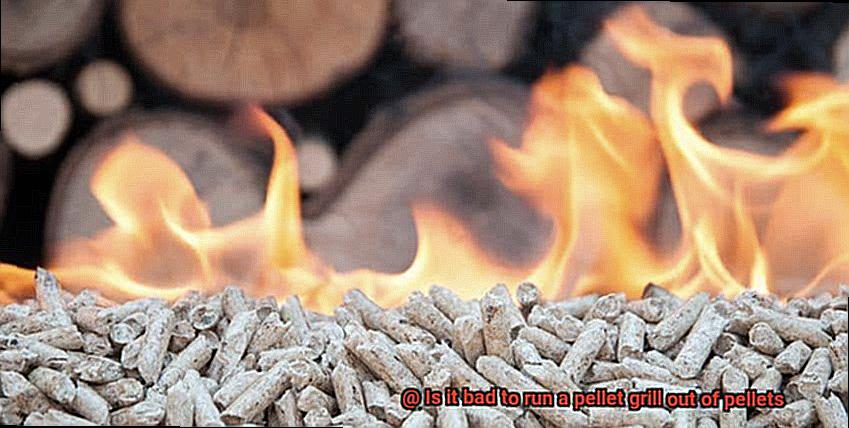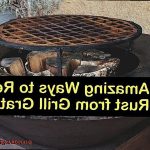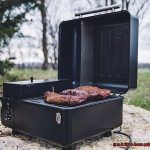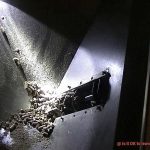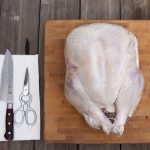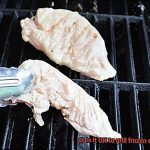Picture this: you’ve got the perfect summer day for a backyard BBQ with your loved ones. You’ve got all the ingredients ready to go, and your pellet grill is prepped and hot. But what happens if you run out of pellets mid-grill? Is it safe to keep cooking without them? Will it damage your beloved grill?
As a proud pellet grill owner, these are valid concerns that may have crossed your mind. Pellet grills have taken the BBQ world by storm in recent years, thanks to their ease of use, efficiency, and consistent results. However, when it comes to running out of pellets mid-grill, there are some important factors to consider.
In this blog post, we’ll dive deep into whether it’s bad to run a pellet grill out of pellets and what consequences you might face if you do. We’ll explore how pellet grills work and why pellets are an essential part of their functionality. Plus, we’ll provide some expert tips on how to avoid running out of pellets and properly maintain your prized pellet grill for maximum longevity.
So grab a cold one and join us as we uncover the truth about running a pellet grill without pellets.
Contents
What is a Pellet Grill?
If you’re looking for a versatile outdoor cooking device that offers the convenience of gas grilling and the rich flavor of wood-fired cooking, look no further than a pellet grill. Also known as a pellet smoker or wood pellet grill, these grills use wood pellets as their primary fuel source to produce heat and smoke.
The automated feed system in a pellet grill delivers the pellets from the hopper to the firepot where they are ignited and burned. This feature ensures consistent heat and smoke production, leaving you free to relax and enjoy your cooking experience.
Pellet grills can smoke, roast, bake, and grill a wide variety of foods, from ribs and brisket to pizza and vegetables. The digital controls allow you to set your desired temperature and walk away, avoiding the constant monitoring required with traditional charcoal grills.
Another benefit of pellet grills is that they produce less ash than traditional charcoal grills. This makes them easier to clean up after use, saving you time and hassle. With a variety of wood pellet flavors available, you can add unique smoky flavors to your food.
However, it’s important to keep enough pellets on hand to avoid negative consequences on the grill’s performance and longevity. Running out of pellets can cause damage and uneven cooking. Ash buildup and increased fuel consumption are other potential issues.
Why Is It Bad to Run a Pellet Grill Out of Pellets?
A pellet grill is an amazing outdoor cooking device that can give your food that delicious wood-fired flavor. However, running a pellet grill out of pellets can cause several problems that can be bad for your grill’s performance and lifespan.
Firstly, running out of pellets can cause serious damage to the auger. The auger is responsible for feeding the pellets into the fire pot. When there are no pellets to feed, the auger can continue to run and grind against itself, causing wear and tear on its components. This can lead to costly repairs or even the need for a replacement auger. So always ensure that there are enough pellets before firing up your grill.
Secondly, running a pellet grill out of pellets can cause temperature fluctuations, which can affect the quality of your food. Pellet grills rely on a consistent supply of heat generated by burning pellets. When there are no pellets, the temperature can drop rapidly, causing uneven cooking and potentially undercooked food. Restarting the grill with new pellets after it has been completely emptied can take time and may not reach the desired temperature quickly enough, leading to further delays in cooking time.
Lastly, running out of pellets can lead to an accumulation of ash in the fire pot. When there are no pellets to burn, the remaining ash can build up and harden, making it difficult to clean and potentially causing damage to the grill’s components. This can also lead to poor airflow and uneven heating, which can affect the overall performance of the grill.
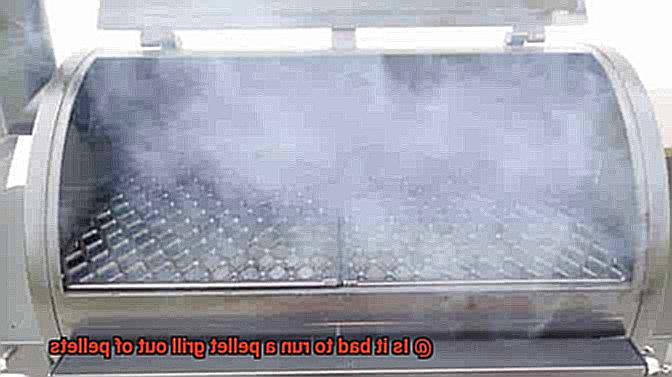
How Does Running Out of Pellets Affect the Heating Element?
Imagine the sound of sizzling meat on your pellet grill, the smell of smoke wafting through the air, and the anticipation of a delicious meal. Suddenly, you hear a hollow clink as the pellets run out. If you’re thinking of risking it and continuing to cook without refilling, think again. Running out of pellets can have some serious consequences for your heating element.
The heating element is the heart of your pellet grill, responsible for igniting and burning pellets to generate heat. When it runs out of pellets, it continues to burn but without fuel, causing it to overheat and potentially damage other critical components. Electrical malfunctions and fire hazards may occur if the wiring and insulation around the heating element melt.
But that’s not all. Running out of pellets can also cause ash and debris to accumulate around the heating element. The complete combustion of pellets produces minimal ash because of binders that hold them together. However, when pellets run out prematurely, they tend to produce more ash and debris that can clog the airflow and affect the performance of your pellet grill.
The consequences don’t stop there. The buildup of ash and debris can cause hotspots on the grill grates, making it difficult to cook food evenly. This issue can ruin your meal, leaving you with undercooked or burnt food.
So what’s the solution? Keep an eye on your pellet levels and refill them as necessary to prevent any damage to your heating element or other components of your pellet grill. Proper care and attention can keep your pellet grill in top shape, allowing you to enjoy delicious meals for years to come.
Can Running Out of Pellets Lead to Ash Buildup?
Imagine you’re grilling up a storm on your pellet grill, but suddenly you hear a hollow clink – the pellets have run out. While it may seem like a minor inconvenience, running out of pellets can have serious consequences, including ash buildup.
When your grill runs out of pellets, the fire will start to die down, but the fan and auger will continue to run. This causes a buildup of ash in your fire pot, which can lead to issues with airflow and combustion. As a result, your grill produces less heat and smoke, affecting the taste and quality of your food. It also makes it harder for your grill to maintain a consistent temperature, causing additional frustration.
But that’s not all. Ash buildup can also damage critical components such as the fire pot or igniter. This can result in costly repairs and even shorten the lifespan of your grill.
To prevent ash buildup when running low on pellets, it’s important to clean out your fire pot regularly. This ensures proper airflow and combustion while extending the lifespan of your grill components. You can also try using high-quality pellets that produce less ash or invest in a pellet grill with an ash cleanout system.
What Are the Effects of Increased Fuel Consumption?
Pellet grilling is an art that requires patience, attention to detail, and a steady supply of pellets. However, many pellet grill enthusiasts overlook the importance of monitoring their fuel consumption. Ignoring this crucial aspect can lead to several negative effects that can ruin your grilling experience. Let’s delve deeper into the effects of increased fuel consumption.
One of the most significant problems resulting from increased fuel consumption is running out of pellets during a cook. This can cause the temperature inside the grill to plummet, leading to uneven cooking and potentially ruining your meal. No one wants to end up with undercooked or overcooked food just because they didn’t have enough pellets. It’s essential to keep a close eye on your pellet levels and ensure you have enough before firing up your grill.
Another issue that arises from increased fuel consumption is the strain it puts on your grill’s components. When your grill struggles to maintain a consistent temperature, it has to work harder to keep up with the demand. This can cause wear and tear on crucial parts such as the auger or motor, leading to costly repairs or even replacement. It’s wise to avoid this by using a pellet grill with a larger hopper capacity or investing in a backup hopper.
Running out of pellets can also affect the flavor and aroma of your food. Pellets are not just a source of fuel; they also add a unique taste and aroma to your dishes. Running out of pellets can result in bland-tasting food that lacks the smoky flavor characteristic of pellet grilling. To avoid this, make sure you have enough pellets before starting a cook so that you can savor mouth-watering, smoky flavors.
Finally, increased fuel consumption can lead to higher costs in the long run. If you find yourself constantly running out of pellets and having to replace them more frequently, it can add up over time and become a significant expense. Additionally, if your grill’s components become damaged due to the strain caused by running out of pellets, you may end up having to replace or repair them, which can be costly. Therefore, it’s better to invest in high-quality pellets that last longer and minimize the risk of damaging your grill.
What Are Some Tips for Avoiding Running Out of Pellets?
There are several tips that can help you avoid this problem and ensure that your cookout goes smoothly.
One of the most important steps is to plan ahead and estimate how many pellets you will need for your cookout. This involves taking into account the size of your grill, the temperature settings, and the duration of the cook. By doing so, you can ensure that you have enough pellets on hand to last for the entire cooking process.
Investing in a pellet level indicator or monitor is another great way to avoid running out of pellets mid-cook. This device allows you to keep track of how much fuel is left in the hopper and gives you an idea of when it’s time to add more pellets. It’s a small investment that can make a big difference in your grilling experience.
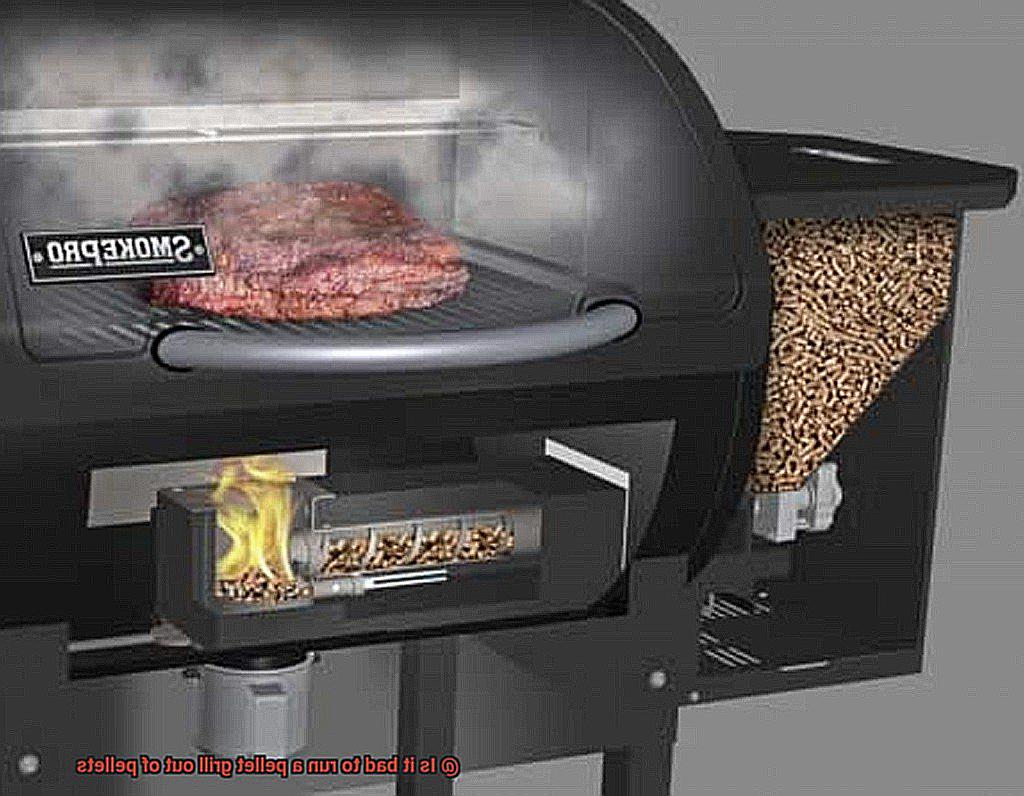
Buying pellets in bulk is also a smart choice, as it can save you money and prevent unexpected runs to the store. Just be sure to store them in a dry and cool place to maintain their quality. Additionally, using the appropriate type of pellet for your grill is crucial. Different types have different burn rates, so choosing the right one can help ensure that you don’t run out during a cook.
Preheating your grill before adding food is another essential tip that can help prevent running out of pellets mid-cook. This allows excess pellets to burn off and ensures that your grill is at the desired temperature before adding food. It also helps optimize the use of pellets by burning off any unnecessary ones before cooking begins.
Lastly, having a backup plan in case you do run out of pellets is always a good idea. This could mean having extra pellets on hand or having a backup fuel source available. By preparing for the worst-case scenario, you can enjoy your grilling session without worrying about running out of fuel.
Is There Anything Else I Should Know About Running a Pellet Grill Out of Pellets?
While it may seem like a cost-effective solution to finish cooking without pellets, there are some serious consequences to consider before doing so.
Firstly, running a pellet grill without pellets can cause severe damage to both the heating element and auger system. These essential components require pellets to function correctly, and without them, the heating element can overheat and burn out while the auger system can malfunction or break.
But that’s not all. Cooking without pellets can also result in uneven temperature distribution. Pellets are designed to burn evenly, ensuring consistent temperatures throughout the cooking process. Without them, your grill may have hot spots and cold spots that can affect the quality of your food.
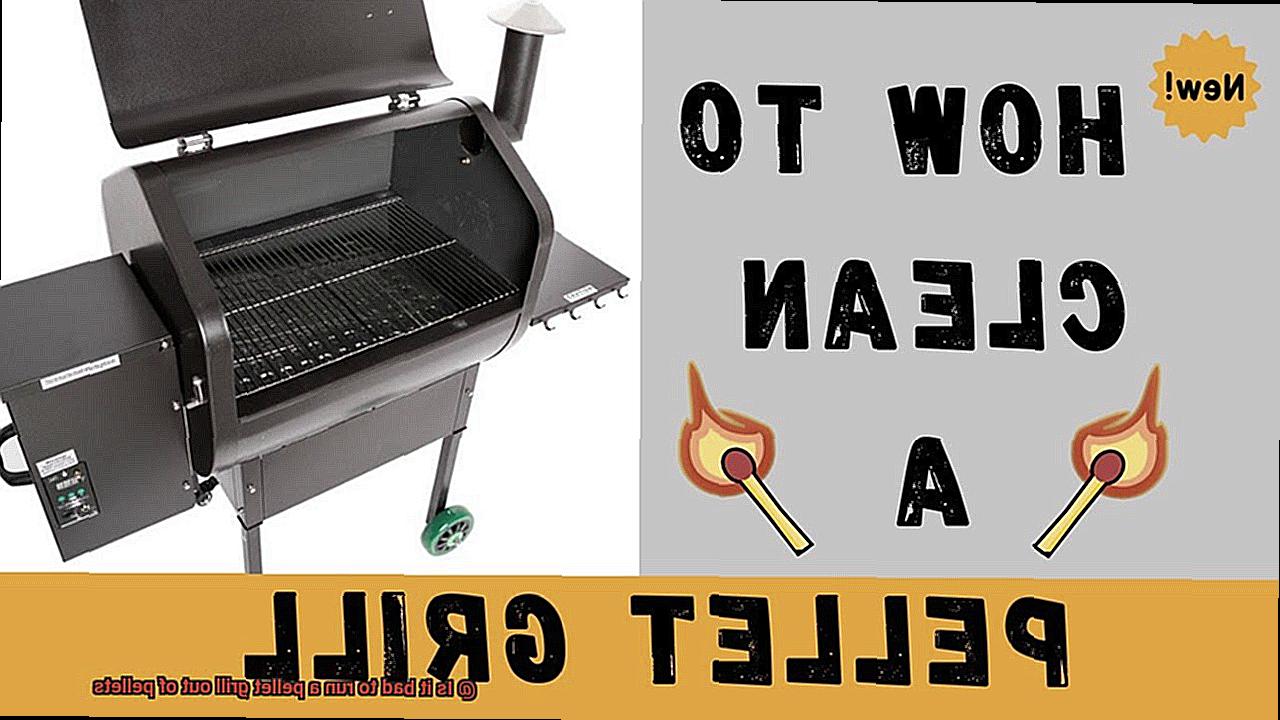
Moreover, running a pellet grill without pellets can cause damage to the hopper and firepot. The hopper is built to store pellets and keep them dry. When there are no pellets, moisture can seep in and lead to rust or other forms of damage. The firepot is where the pellets are burned, and without them, the high heat generated by the heating element can cause significant damage.
So what’s the solution? Plan ahead and make sure you have enough pellets for your cookout. Invest in a pellet level monitor to keep track of your pellet levels, buy pellets in bulk and store them properly, and choose the right type of pellet for your grill. And if all else fails, have a backup plan in place to ensure a successful and stress-free grilling experience.
ehrEOQ0jPRw” >
Conclusion
In conclusion, neglecting to stock up on pellets before firing up your pellet grill can lead to a host of issues that can damage your grill’s performance and lifespan. Pellet grills are designed to be fueled by wood pellets, which provide the heat and smoke necessary for optimal cooking results. However, running out of pellets mid-grill can cause serious harm to critical components such as the auger system, hopper, heating element, and firepot.
The auger system is especially vulnerable when there are no pellets in the hopper as it can get clogged or damaged from overheating. This can result in expensive repairs or even replacements. Temperature fluctuations caused by empty hoppers can also lead to uneven cooking and undercooked food. Moreover, increased fuel consumption due to running out of pellets puts undue strain on your grill’s components and leads to higher costs down the line.
To avoid these pitfalls, planning ahead is crucial. Estimating how many pellets you’ll need for your cookout is a good start. Additionally, investing in a pellet level indicator or monitor can help you keep tabs on your pellet levels and avoid unexpected runs. Buying pellets in bulk, using appropriate types of pellets for your grill, preheating your grill before adding food, and having a backup plan are other helpful tips.
In summary, taking proper care of your pellet grill is essential if you want it to last for years to come without any hiccups. Always make sure you have enough pellets before starting up your grill so that you don’t compromise its performance or longevity.

